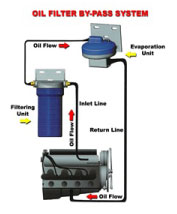
Don’t Go Changin’
Even the best of relationships sometimes have friction and, in most cases, that friction is manageable — unless it takes place inside of a heavy-duty engine. In that case, any particulate over the size of say, three microns – the distance between a piston and a cylinder wall — can lead to a breakup of major proportions.

“Engines equipped with MOT filters can run for years without an oil change.”
Alex Weil, President, Marine Oil Technology
That’s exactly why maintenance supervisors on land and sea make it standard operating procedure to change an engine’s oil regularly, even though filters, oil, tools, and labour all add up to significant ongoing costs.
But just a few short blocks from the Port of L.A., one company – Marine Oil Technology (MOT) – has a patented solution that dramatically reduces the need for costly oil changes, saving operators with trucks, vessels, cranes (or anything that operates with an engine and any type of fuel) both time and money. And, equally important to financial managers during this challenging economy, MOT’s technology provides a remarkably fast return on investment – less than a year in many cases.
Founded by Norwegian-born engineers Laila and Alex Weil, MOT’s Bypass Filtration System uses a progressive five-stage filter core to trap damaging particles as small as one micron. The particulate-free oil then enters a heated evaporation chamber where contaminants such as water, fuel, acid, and other corrosives are removed and ventilated into a collection reservoir.
As a result, independent testing has proven that MOT-fitted engines can be operated many times longer without requiring an oil change, reducing oil purchases and disposal by 89%, according to a U.S. Department of Energy report.*
“Not all filters are created equal,” says Weil. “Conventional filters only trap particulates larger than 20 microns and do nothing to eliminate liquid corrosives. That’s nowhere good enough. We filter everything down to just one micron – smaller than the distance between the piston and cylinder wall. As a result, engines equipped with MOT filters can run for years without an oil change.”
In San Pedro Bay, MOT’s filtration systems are being tested by terminal operator Trapac, Sea Launch, and a large harbour area truck operator.
“In every case, we’re proving through independent testing that companies are saving money and protecting the significant investment they have in their equipment,” says Jim Scott, MOT Vice President. “Plus, our systems make machinery run cleaner, which helps organizations meet environmental standards that are growing more stringent every year.”
The math is pretty simple: Take a standard drayage truck requiring 44 quarts and that typically undergoes an oil change four times a year, or after 300 hours of service. Based on a typical per-quart price of $3 and a typical volume-priced filter at $30, the total cost comes to $678 annually, not including the significant cost of labor to do the job. By comparison, the price of an MOT Bypass Filtration System is approximately $1,200. During a three-year test period, terminal operator Trapac has run a number of its utility tractor rigs without requiring a single oil change – only the disposable MOT filter needs replacing.
Based on those numbers, especially with labor factored in, an MOT system is likely to pay for itself well within a year and will continue to provide ongoing cost savings every year after that. Multiply those savings by every truck in a typical fleet and the benefit to the bottom line is significant.
Marine Oil Technology is currently one of several innovators benefiting from their relationship with PortTechLA, a public/private non-profit technology incubator and commercialization center funded by the Port of Los Angeles, the City of L.A., and the San Pedro and Wilmington chambers of commerce.
“MOT is exactly the kind of organization we want,” says Bill Walles, Director of Client Services for PortTechLA. “They’ve got a cost-effective solution that will save companies many thousands of dollars, they reduce the need for fossil fuels, and they have a technology that’s great for the environment. The sooner the industry discovers MOT, the better.”
For more information on Marine Oil Technology, contact Juan Garcia at 001-310-415-1496 or allnotes@pacbell.net. For information about PortTechLA, go to www.porttechla.org or call 001-310-832-0028.
*U.S. Dept of Energy Report INL/EXT-06-01355
www.porttechla.org
